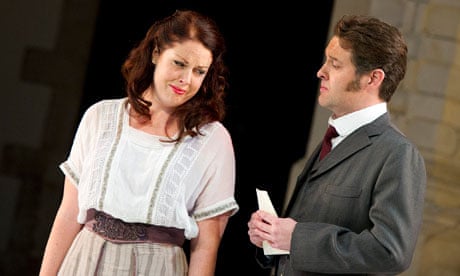Daniel Slater's new production of Eugene Onegin for Opera Holland Park leaves the worlds of both Pushkin and Tchaikovsky behind. Slater shifts the action to the beginning of the 20th century; between the second and third acts, the 1917 revolution takes place, so the Russia to which Mark Stone's Onegin returns really is an utterly different country from the one he had left after Lensky's death. Leslie Travers' frosted set gets adorned with posters of Lenin, and instead of a St Petersburg ball, Tatyana's husband, Gremin, a Red Army general, inspects a workers' parade and delivers his aria like a political speech.
Slater's insights aren't confined to this final historical spin. There's simmering revolt among the peasants who work on the Larina's estate in the first act, where lack of money is clearly a pressing problem and it's clearly Olga (Hannah Pedley) rather than Anna Leese's Tatyana, who is seen by Madam Larina (Anne Mason) as the more likely to make the prosperous marriage that might revive the family's fortunes. Olga's relationship with Peter Auty's rather Italianate Lensky is just a cynical means to that end, while the letter that Tatyana writes this haunted Onegin may be just one of many he receives from his adoring female fans, but as in Pushkin (though not Tchaikovsky) he does make a point of keeping it.
Yet Stone's haunted portrayal apart, the performances just aren't consistently strong enough musically and dramatically to project this bundle of genuinely interesting ideas. Half a dozen more strings might have given the orchestral sound more presence, too, but they wouldn't have supplied the energy and dramatic nous that is so conspicuously lacking in Alexander Polianichko's conducting.

Comments (…)
Sign in or create your Guardian account to join the discussion